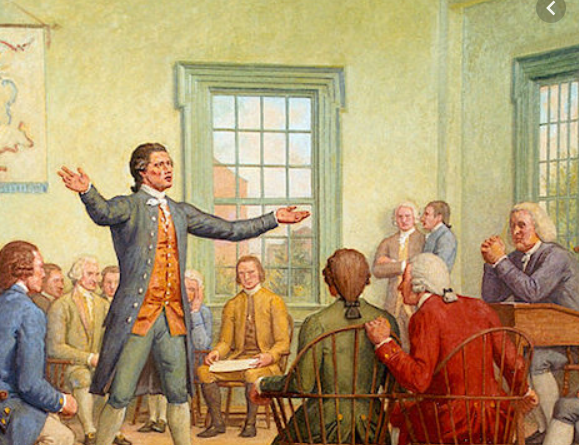Jonathan Blanchard Goes Off In An Extraordinary Manner
Jonathan Blanchard was a longtime Attorney General of New Hampshire.
In 1784, Blanchard was one of several men who left the Confederation Congress hastily as he had become fed up with the lack of ability to govern.
The Congress of the States
During the time between sessions of the Congress of the Confederation, a smaller body was organized to keep the wheels of government moving.
This body was known as the Congress of the States and was made up of one delegate from each State in the Union.
In the summer of 1784, less than a year after the Treaty of Paris was signed, the weaknesses of the Articles of Confederation were already beginning to show. This is when Jonathan Blanchard got on his horse and rode home to New Hampshire.
Jonathan Blanchard
Before the Revolutionary War, Jonathan Blanchard had already risen to the rank of Major in the New Hampshire Militia.
Already a leader in his community, Blanchard was elected to the New Hampshire Provincial Congress in the build up to revolution. After independence, he was chosen for the State House of Representatives.
By 1777, Jonathan was his State’s Attorney General. In this position, he was charged with prosecuting crime on behalf of the government. He held this position for five years.
After his stint as Attorney General, Blanchard was sent to the Continental Congress.
Wasting Time
While in Congress, governing had hit a standstill.
The Congress was barely able to get delegates from the necessary nine States needed to do any business. Additionally, when they did have nine States represented, they could not actually get anything done without unanimous consent. Since there were never representatives on hand from all thirteen States, governing became impossible.
Moreover, the Congress of the States (the temporary body mentioned above), only seemed to propose changing locations. The motion would be voted on and turned down, repeatedly.
Attending Congress had clearly become a waste of time.
To be fair, Jonathan Blanchard was not the only one to make an ‘extraordinary’ exit in mid-August of 1784. Francis Dana and Samuel Dick also left the same day.
Many people were not happy with their decision, however. James Madison and Jacob Read both wrote to colleagues about their disappointment. Others, like John Sullivan, were a bit more understanding.
Effects on the Government
Blanchard’s evacuation of Congress demonstrated a major problem with the Articles of Confederation. Namely, that just a few men could leave the Capitol and completely halt the government.
However, his leaving showed that there were bigger issues with the Articles. The main detraction was that the government had no way of forcing its delegates to show up.
Ever since the Revolutionary War had ended, few people found it necessary to attend their sessions of Congress. This meant that the Federal government was, in actuality, not a government at all.
It was in response to Jonathan Blanchard’s departure that many Founders began debating way by which to make the United States government into a more respectable body. It would not be long before a group of men convened in Philadelphia to produce a new Constitution.
If you’d like to learn more about the end of the Articles of Confederation, check out my articles on James Schureman and Philip Pellham.
Furthermore, to read about the transition from the Articles of Confederation to the Constitution, pick up a copy of ‘We Have Not A Government’ from the affiliate link below.
Please remember to subscribe to our email list for a new Founder every day.






